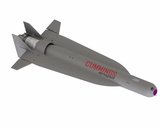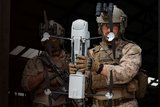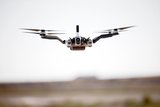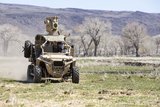AFRL testing highly-efficient diesel aircraft engine
The Air Force Research Laboratory (AFRL) Advanced Power Technology Office has completed a ground test series on a new highly-efficiency diesel aircraft engine, the US Air Force announced on 11 August.
Designed by Engineered Propulsion Systems, the Graflight V-8 4.3L diesel engine is designed to use up to 40% less fuel than typical aircraft engines while increasing range and loiter time by up to 50%. It is liquid-cooled and capable of using either a composite or aluminium propeller.
According to the AFRL, the 'clean sheet' design engine is a potential replacement for current manned and unmanned aircraft internal combustion engines.
Using a new control unit, the engine can operate using readily available diesel, Jet-A, or JP-8 fuels, thereby reducing or eliminating the need to transport specialised fuels. This flexibility opens up the possibility of unmanned aircraft use in regions that were previously impractical.
During the ground testing, the engine was taken through a range of simulated operational flight conditions, from sea-level to 30,000ft and back, successfully generating data on performance factors such as fuel consumption, calibration, vibration and power output.
The AFRL will use this data to prepare for future flight testing, confirm the engine’s efficiency and validate engine performance for future air force users.
Capt. Randall Hodkin, the APTO Aviation Working Group lead, said: 'Since this engine requires less fuel to fly the same distance, an aircraft or unmanned air vehicle could either carry more payload or fly a longer mission. Overall, if implemented, this technology has the potential to provide the air force a significant improvement in mission flexibility.
'Often one of the greatest military logistics burdens is fuel transport. If we can reduce or eliminate the need to ship specialised fuels, we’ve then reduced the associated cost and risk.'
More from Uncrewed Vehicles
-
![Cummings Aerospace showcases Hellhound loitering munition designed for US Army’s LASSO programme (video)]()
Cummings Aerospace showcases Hellhound loitering munition designed for US Army’s LASSO programme (video)
Cummings Aerospace presented its turbojet-powered Hellhound loitering munition at SOF Week 2025, offering a man-portable solution aligned with the US Army’s LASSO requirements.
-
![SOF Week 2025: PDW unveils attritable FPV drone for SOF operations at scale]()
SOF Week 2025: PDW unveils attritable FPV drone for SOF operations at scale
PDW has revealed its Attritable Multirotor First Person View drone at SOF Week 2025, offering special operations forces a low-cost, rapidly deployable platform for strike and ISR missions, inspired by battlefield lessons from Ukraine.
-
![SOF Week 2025: Teledyne FLIR white paper provides guidance on reusable loitering munitions]()
SOF Week 2025: Teledyne FLIR white paper provides guidance on reusable loitering munitions
Teledyne FLIR is highlighting the emerging requirements for 'recoverable and re-usable' loitering munitions across the contemporary operating environment during this week’s SOF Week conference in Tampa, Florida.
-
![SOF Week 2025: Kraken Technology group debuts K3 Scout USV in North America]()
SOF Week 2025: Kraken Technology group debuts K3 Scout USV in North America
High-performance maritime industry player Kraken Technology Group, based in the UK, has used the SOF Week conference in Tampa, Florida this week to debut its K3 Scout uncrewed surface vessel (USV) to the North American market.
-
![Palladyne AI and Red Cat to demonstrate capabilities for autonomous drone swarms to the US military]()
Palladyne AI and Red Cat to demonstrate capabilities for autonomous drone swarms to the US military
Red Cat and Palladyne AI recently conducted a cross-platform collaborative flight involving three diverse heterogeneous drones.
-
Jammer resistant drone designs spark search for countermeasures
The Russia-Ukraine conflict has driven another stage of evolution for drones and the counter measures to defend against them.

























